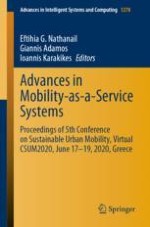2021 | OriginalPaper | Buchkapitel
How Public Transport Could Benefit from Social Media? Evidence from European Agencies
verfasst von : Georgios Georgiadis, Anastasia Nikolaidou, Ioannis Politis, Panagiotis Papaioannou
Erschienen in: Advances in Mobility-as-a-Service Systems
Aktivieren Sie unsere intelligente Suche, um passende Fachinhalte oder Patente zu finden.
Wählen Sie Textabschnitte aus um mit Künstlicher Intelligenz passenden Patente zu finden. powered by
Markieren Sie Textabschnitte, um KI-gestützt weitere passende Inhalte zu finden. powered by
